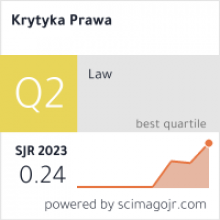The process of advancement of artificial intelligence (hereinafter: AI) seen in recent years results in breakthroughs in many areas of human life, such as medicine, agriculture, and science. However, despite its many advantages and benefits, it also inevitably creates room for abuse. This is particularly true of child pornography, where AI systems are increasingly being used to generate nude images of minors — both existing in reality and fictional. These cases, given much attention in the public debate, cause doubts as to whether existing normative solutions are suitable to combat this new phenomenon. The article aims to answer the question of whether the existing law makes it possible to successfully prosecute perpetrators who use AI systems to generate child pornography (including that depicting fictional characters). In addition, it also offers an analysis of the criminal liability of the developers of the AI systems used in this process and of the hosting providers managing the websites used to distribute such pornographic content.







